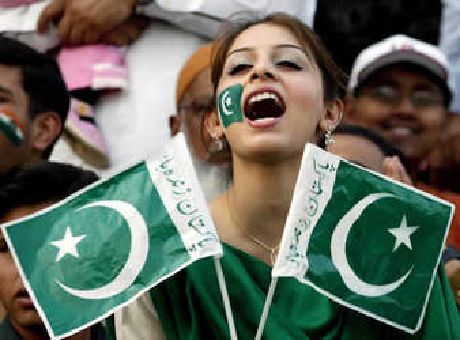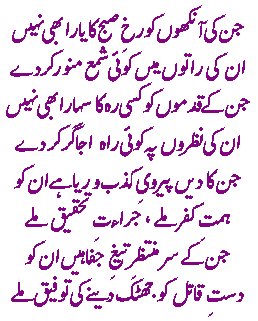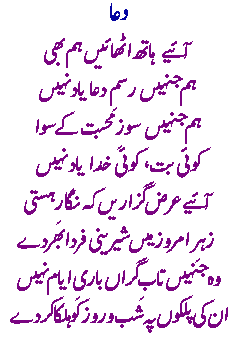
Today is a good day to talk about ‘Pakistaniat.’
The name of this blog is ‘All Things Pakistan’ or ATP. But the title in the URL is ‘Pakistaniat’ which would loosely translate as ‘Pakistani-ness.’ The blog is named thus because it was borne out of a conversation with a friend on what makes a Pakistani a Pakistani. The purpose of this blog is to continue and broaden that conversation, to make it ongoing, and to involve more people in it.
Of course, there are many way to talk about Pakistaniat. In fact, that is all we do on ATP, all the time, and in all sorts of ways. One way to do so is through poetry. We thought maybe we should ask you to share with us a favorite verse, a sheyr, a nazm, a line from a song, anything that conveys some sense of something you would consider Pakistaniat… poetry that tugs at you on this Independence Day… the canvas is wide, choose whatever you may.
To set the ball rolling, let me offer some of my favorites.
Let me start with one of my favorite national song (see here for my all time favorite national song). It used to be played a lot around 1970 (I think the poet is Asad Muhammad Khan and was sung by Shahnaz Begum). I always thought that the essential idea behind it was quite unlike most national songs:
mauj baRhay kay aanDhi aa-aye, diya jala-aye rakhna hai
ghar ki khatir sau dukh jhailaiN, ghar tou aakir appna hai
On a more profound note, heere is a Dua (prayer) from Faiz. I absolutely love the line about “himmat-e-qufr millay, juraat-e-tehqeeq milay” (read the line before this one for context). Ameen.


I found this English translation here but not sure by whom. My hunch is that it is not from Agha Shahid Ali (The Rebel’s Shilloute), but I may be wrong:
Come, let us join our hands in prayer.
We, who can not remember the exact ritual
We, who, except the passion and fire of Love,
do not recall any god, remember no idol.Let us beseech, that may the Divine Sketcher
mix a sweet future in the present’s poison
For those who can’t bear the burden of time,
the rolling of days on their souls, may He lightenThose, whose eyes don’t have in their fate, the rosy cheek of dawn
may He set for them some flame alight.
For those, whose steps know no path
may He show their eyes some way in the night.May those whose faith is following falsehood and pomp
have the courage to deny, the boldness to discover.
May those whose heads wait for the oppressors sword
have the ability to push off the hand of the executioner.This secret of Love, which has put the soul on fire,
may we express it today and the burning be gone.
This word of Truth that pricks in the core of the heart,
may we say it today and the itching be gone.
I apologize for posting this yet again, but this seems to be an appropriate place to revisit my video rendition of Faiz’s hum daikhain gay. I have discussed this poem’s importance to ATP’s ethos here and the original and Maniza Naqvi’s translation are available here.
Click on the arrow at the center of the image below
Main picture credit: Cricket spectator in Lahore (from Daily Times).



















































Aziz Sb
I appreciate you identified it.
But unfortunately, none of our politicians believe in “Quwat-e-Akhuwat-e-Awam” (empowerment of masses), though every leader promises for that. I think credit goes to Z A Bhutto who gave that awareness to the public about their empowerment. But practically, the people have never been empowered in our country.
But still I am hopeful, as Faiz Sahib said ” Hum dekhain gay…..” and its a great hope.
Adil,
Thanks for composing this video, as I see it almost everyday just to strengthen my hope and commitment.
Pakistan Hamesha Paaindabad !!
Adil,
Ahmad Rushdi was a very good and entertaining filmi singer. As a child I remember my father playing his Ahmed Rushdi LP for us with songs like ‘Coco Coreena’ and ‘Bandar road se Keamari’. I think a future post on Ahmed Rushdi would be a great tribute to a forgotten artist. On a recent trip to Pakistan I was able to find “bandar road se” on a CD. I love the folksy words of the song and listening to the language one can picture a gregarious Tange waala, most likely a migrant from UP chatting up his babu customer. I am not from karachi and don’t have much association with the city but the song is so wonderful it brings the entire image of a bustling city to mind. It took me a while but I wrote down the lyrics of the song and some of your readers might enjoy them:
Bandar road se keamari
Meri chali re ghora gari
Babu ho jana footpath per
Buson ki aaj hui hartal
Sawaari ki phir kya hai kaal
Khuda deta hai roti daal
Zara chal ghore sarpat chaal
Hui meri gaari over load
Jiyo meri kaali bandar road (Babu ho jana —
Yeh aya radio pakistan
Hai goya khabron ki dukan
Tu is ke gumbad ko pehchan
Kahin masjid ka ho na guman
Keh hota hai dars-e-Quran
Kabhi gumshudgi ka ailaan (Babu —
Yahan hote hain Bundu Khan (“the famous sarangi nawaz of the sub-continent”)
Yahan darbari aur kalyan
Yahin pe koi tamancha jaan
Sunaye geet ghazal ki taan
Magar hum koorhon ke yeh kaan
Karen lai turki kya pehchan (Babu —
Gawaiyya Shaair Mauseeqar
Hai sab ka naam yahan fankaar
Mulazim sab na paaidaar
Magar barson ke wazeefa khar
Yeh hai fun ka joona bazaar
Keh sub ka hota hai byopaar
Hai meerasi bhi actor bhi
Guni bhi mast qalandar bhi
Jahan hein news reader bhi
Shakeel Ahmed bhi Anwar bhi
Yahin kas artist banta
Jo hota raja inder bhi (Babu —
Yeh aya Eid ka maidaan
Yahan ki bhi hai nirali shaan
Anokhe yahan ke ristoran
Keh un ka baasi sub pakwan
Yeh kulfi, kheer, kabab aur naan
Hain sub beemari ke samaan (Babu —
Sarak ke beech woh chauraha
Woh dekho naach sipahi ka
Traffic ka yeh un daata
Hai topi —
Kidhar jaata hai o riksha
Abay chaalan karay ga (Babu —
Yeh aayi Lakshmi building
Kabhi thi sub se bari building
Jo Lalu Khet se bhi dekho
Nazar aati thi yehi building
Tha jin ka is mein ik daftar
Woh ab rakhte hain kai building (Babu—
Hua mera ghora kum raftar
Keh aaya Bolton Bazaar
Traffic ki hai yahaan bharmar
Keh paidal chalna bhi dushwaar
Traamon ka yeh bara junction
Har ik jaanib hai cheekh-o-pukar (Babu —
Yeh hai Bombay Bazaar
Phalon ka hota hai byopaar
Pare hain Seb, Angoor, Anaar
Musambi, malte rasdaar
Safedo-Surkh to dukan daar
Magar Gaahak Laghir Beemar (Babu —
Chalo hum pohanch gaye Tower
Keh jis ke baaju Kharadar
Buson ka hai yeh ik tunter
Khare hain bohat se conductor
Traffic ka yeh one way route
Yahin se khata hai chakkar (Babu —
Chalo ab utro babu ji
Tumhari manzil aa pohnchi
Yahi hai Karachi ki godi
Jise kahte hain Keamari
Banore yahan se jana ho
To lei jaye gi tumhen kashti (Babu —
I will stop now. As they say “baat se baat nikalti hai”. Some other time it would be interesting to reflect on the Lakshmi Buildings in various Pakistani cities (mentioned in this song) which used to primarily belong to the Lakshmi Insurance Company before partition.
Aziz Saab. Wonderful point about
Pak sarzameen ka nizam?
Quwat -e- akhuwat-e -awaam
For me, that insight alone makes all the effort behind this blog worth it.
Also wanted to add that the one contemporary singer who personifies my sense of Pakistaniat morre than any is Abrar ul Haq. One of my favorites is his song “Sar utha kay …” Here a few lines (note especialy the message in the third set):
Sar utha kay sehr mein chalnay ka mausam aa gaya
aa-oo kay mausam badal dainay ka mausam aa gaya
…. aa-oo zaara…. doostou, aa-oo zaara
Aa-oo jhaRRo cheen laiN inn nanhay haathouN saykay abb
haath meiN inn kay qalm dainay ka mausam aa gaya
kabb talak qaghaz chunaiN koochouN gay ganday Dhair mein
konpalouN kay phool meiN dhalnay ka mausam aa gaya
…. aa-oo zaara…. soochoo zaara
ghair Muslim ho kay Muslim, sabb ka appna ghar hai yeh
sabb nay jeena bhi hai, marna bhi hai iss aaghosh meiN
woh jo nafrat DaltaiN haiN inn dilouN meiN jaan laiN
unn sarouN ki fasl jhuk jaanay ka mausam aa gaya
…. aa-oo zaara…. doostou, aa-oo zaara
Of course, his Punjabi songs are, in my view, reeking with Pakistaniat even more. Here, for example, is a wonderful analysis of our economic dependence:
IMF touN qarza lai kay saarey mulk phirawaN ga
World Bank da tarla paa kay shopping we karwawaN ga
…. aa bai ja saikal tey!
[I will get a loan from IMF and take you on a world tour
and will beg and plead to teh World Bank so I can take you shopping
…. so, come and sit with on on my bicylce!]
Do you also get the sense he may be talking about government foreign tours ;-)
Anyhow, I could go on and on on Abrar… but, I guess that is a seperate post!
Roshan,
Writing down the anthem was helpful. It made me notice one thing, which I hadn’t noticed all these years. Ponder these two lines in the anthem carefully:
Pak sarzameen ka nizam?
Quwat -e- akhuwat-e -awaam
Notice that it does not answer the question by saying Shariat or Islam. In other words, the nizam or system of government in Pakistan was meant to be, at least in the mind of the author, “power to the poeple and togetherness of its citizens”. It seems the author of the anthem had a much broader vision of Pakistan than we have today.
Adil,
I agree with you, it is a touching poem and written in very simple language. It was written in 1981, a dark period in the history of Pakistan.
Anyway, I don’t want your readers to feel despondent and therefore would like to share with them a relatively optimistic couplet, again, from Faiz:
Halqa kiyey baithay raho is shama’ ko yaaro
Kuch roshni baqi tau hai, har chand keh kam hai
Keep sitting around this lamp
It still shines, even though barely.